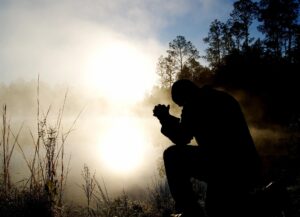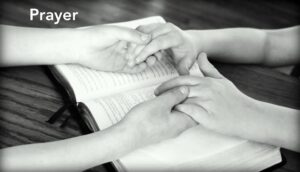Week 9
Faith
Goal
To understand the connection between faith and health.
- To identify the importance of living with faith
- To learn the meaning of faith
- To increase the measure of faith

Hebrews 11:1 - Now faith is the substance of things hoped for, the evidence of things not seen.
We are living in a time of war. The Ukrainians and the Russians are fighting against each other. Each side aims at acquiring and utilizing armaments in the war against each other. Each side is bent on winning. But when Jehoshaphat, a man of courage, realized that his kingdom, Judah, was invaded by an army, he took a different approach. His first thoughts were not to assess the strength and capabilities of the enemies, or develop strategic plans. King Jehoshaphat “was well prepared to meet almost any foe; yet in this crisis he put not his trust in the arm of flesh” (Prophets and Kings, p. 198). The king turned to the God of heaven for help, and he encouraged the people to follow his example.
How serious was this king about protecting Judah from the Moabites and the Ammonites who were coming against them with a great multitude? What would your thoughts be if in such an emergency your country’s leaders decided to do nothing until they heard a word from the Lord? The messenger who gave the king the news painted a vivid picture of the battle that was looming, explaining that the enemies were coming from beyond the sea on a specific side of Syria, and noted where they were stationed at the moment he was delivering the news. That Judah was in a state of emergency was no joke!
“No problem,” Jehoshaphat thought; “I will resort to prayer. I will seek the Lord, and proclaim a fast throughout all Judah.”
And Judah gathered themselves together, to ask help of the Lord: even out of all the cities of Judah they came to seek the Lord. And Jehoshaphat stood in the congregation of Judah and Jerusalem, in the house of the Lord, before the new court, And said, O Lord God of our fathers, art not thou God in heaven? and rulest not thou over all the kingdoms of the heathen? and in thine hand is there not power and might, so that none is able to withstand thee? Art not thou our God, who didst drive out the inhabitants of this land before thy people Israel, and gavest it to the seed of Abraham thy friend for ever? And they dwelt therein, and have built thee a sanctuary therein for thy name, saying, If, when evil cometh upon us, as the sword, judgment, or pestilence, or famine, we stand before this house, and in thy presence, (for thy name is in this house,) and cry unto thee in our affliction, then thou wilt hear and help. And now, behold, the children of Ammon and Moab and mount Seir, whom thou wouldest not let Israel invade, when they came out of the land of Egypt, but they turned from them, and destroyed them not; Behold, I say, how they reward us, to come to cast us out of thy possession, which thou hast given us to inherit. O our God, wilt thou not judge them? for we have no might against this great company that cometh against us; neither know we what to do: but our eyes are upon thee. (2Chronicles 20: 4-12).
The Lord spoke to all Judah through Jahaziel saying, “...Thus saith the Lord unto you, Be not afraid nor dismayed by reason of this great multitude; for the battle is not yours, but God’s. ….Ye shall not need to fight in this battle: set yourselves, stand ye still, and see the salvation of the Lord with you, O Judah and Jerusalem: fear not, nor be dismayed; to morrow go out against them: for the Lord will be with you” (2 Chronicles 20: 15, 17). Upon hearing the Word of God, the king and all Judah bowed their heads, and fell before the Lord, and worshiped Him. Early in the morning they then went into the wilderness of Tekoa where the king met with the people and appointed singers unto the Lord. These singers would go before the army singing praise to God for the promise of victory.
While Judah was praising the Lord with singing, “the Lord set ambushments against the children of Ammon, Moab, and Mount Seir, which were come against Judah; and they were smitten. For the children of Ammon and Moab stood up against the inhabitants of Mount Seir, utterly to slay and destroy them: and when they had made an end of the inhabitants of Seir, every one helped to destroy another” (2 Chronicles 20:22, 23). In the end, not one person had escaped death. When Judah approached the watchtower in the wilderness, they discovered all the dead bodies. And they had not used a single weapon, but the weapon of praise
The result of the showdown in the wilderness was clear evidence that God had come to the help of His people during this crisis. The king of Judah and his armies placed their faith in God. They were aware of victories that had been won before by the Lord, and they believed that God would now come to their aid as they humbly asked Him for help. And what a signal victory it was! The Lord was triumphant!

- What did the people of Judah do to show that they supported King Jehoshaphat?
- Why do you think the people of Judah trusted the king?
- What were the instructions that Jehoshaphat gave to the people as they headed to the battle?
- What does it mean to believe in the Lord?
- What method did the army of Judah use in going to battle against their enemy?
- Praise to God is a powerful way of increasing faith. Why do you think this is so?
- How did God ensure that Ammon and Moab lose the battle?
- God says, “For as the heavens are higher than the earth, so are my ways higher than your ways, and my thoughts than your thoughts” (Isaiah 55:9). How is this true in the story?
- How would you describe God’s method of fighting in the war?
- How did the people of Judah glorify God? And how did God bring glory to His name?
- How have you been encouraged by this story? Explain.

Overcoming trauma requires a supernatural gift that God has given each person. God has promised to supply every need, which includes physical, emotional, and spiritual needs. To help every child overcome mental struggles, He has given the gift called faith. Faith serves as a powerful tool for the healing of the mind.
What does it really mean to have faith? Hebrews 11:1 defines faith as "the substance of things hoped for, the evidence of things not seen." Faith makes it possible for one to live with hope, joy, and peace. It gives the confidence needed to persevere against all odds. Faith is the result of believing the gospel message, or the good news that Jesus loves us, has died for our sins, and has made a way for us to be right with God, and spend eternity with Him in heaven. When people allow the reality of the gospel to affect every part of their lives (mind, body, and soul), it changes the way they think, which changes how they feel and how they behave. Living with faith causes people to act on what they have not experienced yet, to believe promises in the Bible that are yet to be fulfilled, and to trust God even when difficult situations show no change for the better.
The Bible outlines the blessings of living with faith. Here are a few examples.
Faith in God gives strength. Psalm 138:3 says, "In the day when I cried out, You [God] answered me, and made me bold with strength in my soul.” When faith is utilized, God shows us that we are never alone. We have the Creator of the Universe on our side during every trial.
Faith in God gives courage. Courage is the ability to do what scares us, to act on our beliefs despite threats of danger. The book of Esther, for example, paints a vivid picture of how Queen Esther endured the schemes of her enemy and gained favor with the king to save her people. Courage also shows strength in the face of grief or pain. It should be noted, however, that courage and strength are not the same, though they are often seen together. But courage, like strength, comes directly from our faith in God.
Faith in God provides stability. Some individuals seem unshakable. Take, for example, a classmate who chooses to take a deep breath when the computer crashes instead of slamming her head on the desk, or starting to scream. It may be a teacher who manages to keep her calm as her students are not paying attention in class. We all want to persevere through the day without melting down or throwing a tantrum (despite how we feel at times). Faith in God allows us to experience stability in the middle of instability. When life feels out of control, we take comfort in knowing God is in charge.
In the Bible, Daniel’s life provides several examples of stability in the face of turmoil. Daniel and many other Israelites were kidnapped and forced to join the Babylonian king’s service. This meant new food, new clothes, new language, new customs, and new everything. But even though Daniel was a hostage, he stayed true to what he knew about God (Daniel 1:1-8). Faith can do a lot of things in your life if you let it. It will grow you and allow you to do things you never thought yourself capable of. It will turn you into a dreamer who really believes that with God, all things are possible (Matthew 19:26).
Faith in God improves overall wellbeing. There is much scientific evidence to support this stance. Studies show that having faith reduces stress in the body. Living with stress has a direct negative effect on the immune system, reducing the ability of cells to attack disease inside the body. Prayer, worship, and other spiritual activities which build faith can balance out the stress response by producing a relaxing effect upon the body.
Faith gives people a sense of meaning and purpose in life, which is also linked to better health. The brain controls every aspect of our bodies, so how we think affects how our bodies respond to difficulties. Even faith-filled Christians can suffer from depression and other forms of mental illness. Faith, on the other hand, offers an additional buffer against the impacts of depression. Faithful Christians can also get physically sick and lead lives affected by disease or ailments. However, there is the belief that God’s authority stretches to the mental, physical as well as the spiritual, and there is also faith that causes them to accept His authority over the entire life.
Faith makes Christians more willing to help others. Did you know that Christians were the first to create the world’s first hospitals? Faithful Christians in the healthcare profession have been essential to missions and ministry around the world, helping thousands of people. Faith’s greater health benefit comes to those who help others. For example, according to sociologist Christian Smith, people who tithe, or give away 10 percent of their income, are on average 10 percentage points more likely to be very happy with their lives. Since religious people are more likely to give to charity, and volunteer to help others, they are also more likely to experience the health benefits of helping others. “Let the perplexed ones search out others who are in perplexity and speak to them words of hope and encouragement. When they begin to do this work, the light of heaven will reveal to them the path that they should follow. By their words of consolation to the afflicted they themselves will be consoled. By helping others, they themselves will be helped out of their difficulties. Joy takes the place of sadness and gloom. The heart, filled with the Spirit of God, glows with warmth toward every fellow being. Every such one is no longer in darkness; for his “darkness” is “as the noon day” (2MCP 431.3). Simply, the benefits of living with faith come with tremendous blessings for those who choose to accept the challenges of helping others.
To grow your faith requires one simple act. Romans 10:17 says, “So then faith cometh by hearing, and hearing by the word of God.” It is spending time in the Word of God. This will increase your faith. Romans 12:3 assures us, “God hath dealt to every man the measure of faith.” It is up to each individual to use and exercise this wonderful gift.

- In your own words, what is the meaning of faith?
- How do Christians benefit from living with faith?
- How are courage and strength different from each other?
- Where does faith come from?
- What are some things you can do to grow your faith?
- How does having faith improve the lives of people?

- Immune system: a complex network of organs, cells and proteins that defends the body against infection, whilst protecting the body's own cells.
- Perplexity: a state of confusion or a complicated and difficult situation or thing.
- Stability: the quality of being unchanging
- Stress: how we react when we feel under pressure or threatened

Activity
Choose a Psalm from below. Read it prayerfully two or three times. Write a summary of what you believe the Psalm is saying. Then write three ways you can strengthen your faith through praise.
Psalms 8, 30, 103, 105, 106, 145, 146 and 147

Dear Father in Heaven, thank you for the faith we have in Christ. May we learn to grow in our faith. Teach us to study the Word daily that we may grow to be like Jesus. Help us to believe the power that is in knowing You. Continue to heal our hearts from all emotional pain. May others see You in the way we live our lives. In Jesus' name we pray. Amen.


